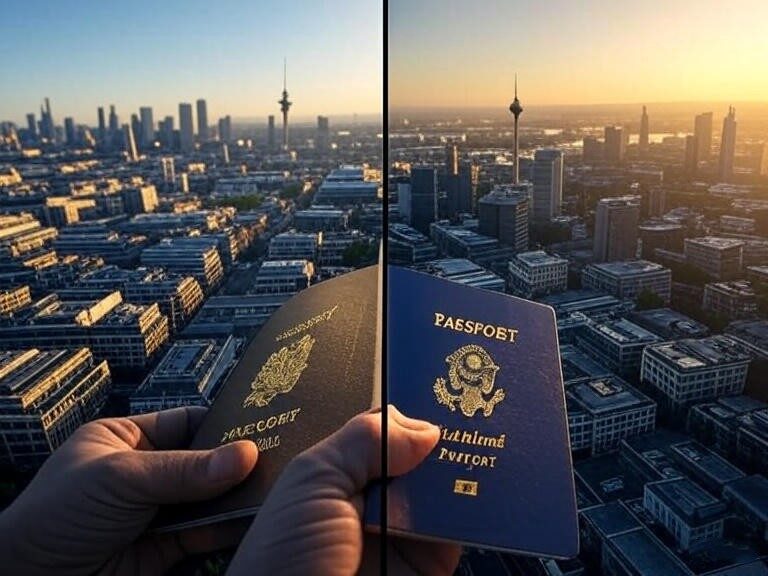New Zealand. Aotearoa. The Land of the Long White Cloud. It conjures pictures: emerald fjords cutting through mountains, infinite coastlines battered by wild seas, and sheep-dotted hills under skies impossibly great and clean. It’s an area of mind-blowing splendor, frequently ranked as one of the maximum ideal on the planet. Yet, woven deep into the cloth of being Kiwi is some other, reputedly contradictory thread: the profound, regularly vital act of leaving. Our record isn’t always simply considered one of arrival and settlement; it is equally a tale of departure, of doing away with these beaches, propelled by way of necessity, curiosity, struggle, or that quiet, continual whisper of the broader world. The adventure from New Zealand isn’t just an experience; it is a ceremony of passage, a shaping force, and a narrative etched into our country’s soul.
The First Leavers: When the Ocean Was the Only Road
Our story of leaving begins long before Europeans sketched these islands onto their maps. For the ancestors of Māori, the journey to Aotearoa around 700-800 years ago was an epic feat of navigation and courage. But arrival didn’t mean the end of voyaging. Waka (canoes) remained vital connectors. Journeys back to Hawaiki, the spiritual homeland, were undertaken – not physically, perhaps, in the literal sense for all, but deeply embedded in whakapapa (genealogy) and oral tradition. More tangibly, travel among islands, for exchange, sources, marriage, or strategy, became consistent. Leaving the safety of 1 acknowledged coast for the uncertainty of another, guided via stars, currents, and generations of expertise, was an inherent part of lifestyles. The ocean wasn’t a barrier; it became the road. This ingrained courting with the sea, this expertise of departure as intrinsic to connection and survival, laid the earliest foundation for the Kiwi journey outwards.
The Distant Mother: The Pull of “Home” and the Colonial Exodus
European settlement brought a different kind of leaving. For the first Pākehā (New Zealanders of European descent), New Zealand was the destination, often a desperate leap into the unknown, fleeing poverty or strife. Yet, even as they carved out lives in this new land, the umbilical cord to “Home” – meaning Britain – remained taut and powerful. New Zealand was an outpost, a colony. Its culture, institutions, and loyalties were fiercely British. This created a powerful centrifugal force.
The Grand Tour (in Reverse): For the colonial elite, the essential journey was “Home” to Britain. It was about completing an education at Oxford or Cambridge, experiencing the cultural heartland, establishing connections, and reinforcing identity. Returning to New Zealand with this experience conferred status and authority. This pilgrimage solidified the idea that true culture, sophistication, and belonging lay elsewhere.
Seeking Fortune: While New Zealand offered opportunity, the vast British Empire offered more. Young men, and increasingly women, left for careers in the colonial service in Africa, Asia, and elsewhere. The “OE” (Overseas Experience) of the 20th century has deep roots in this colonial career trajectory.
The War Effort: Nothing demonstrated the pull of the distant “Home” more powerfully than the world wars. When Britain declared war in 1914 and 1939, New Zealand, without hesitation, did too. Young guys—Pākehā and, increasingly, Māori—volunteered in their tens of hundreds. They left on troopships from ports like Wellington and Lyttelton, frequently with bands playing and crowds cheering, certain no longer only for conflict but also for a place most had never seen, to guard a concept of “Home.” The journey turned into exhausting and terrifying, and for plenty, one-way. Gallipoli, the Somme, El Alamein, Monte Cassino—those names have become etched in New Zealand’s memory now not just as battlefields, but as destinations on a journey of titanic sacrifice from those shorelines. The departure became an act of loyalty, but going back (for individuals who made it) often brought a complicated mix of trauma and a diffused shift in angle. They had visible the world, and the arena had changed them.
The OE: A National Institution and Identity Forge
Post-World War II, particularly from the 1960s onwards, the journey from New Zealand evolved into something more personal, yet no less significant: the Overseas Experience (OE). It became, and remains, a near-universal Kiwi ritual. Why?
The Tyranny of Distance (and the Cure): New Zealand is far from everywhere. This isolation bred curiosity. What was out there? Beyond the postcards and BBC broadcasts? The OE was the antidote to the tyranny of distance. It was about experiencing history older than a century, art galleries bigger than a shed, and cities where you could get lost for days.
The Itch of Restriction: Mid-20th-century New Zealand, while prosperous, could feel provincial, conformist, and culturally limited. Britain, and later Europe, North America, and Asia, represented sophistication, freedom, and difference. Leaving was an escape hatch, a chance to breathe different air.
The Working Holiday: Crucially, the OE wasn’t just for the wealthy. It was democratised by schemes like the assisted passage to Britain (the “Ten Pound Pom” scheme, which Kiwis also used) and later, working holiday visas. Kiwis became legendary in London pubs, Australian mines, Canadian ski resorts, and Japanese teaching jobs – working hard to fund their travels. They became barmen, nannies, fruit pickers, nurses, and teachers abroad. This wasn’t tourism; it was immersion, often gritty and real.
The Kiwi Diaspora: The OE sometimes became emigration. Skills were in demand overseas. Opportunities appeared brighter, salaries better, the tempo faster. London, specifically, became a type of second capital, with its personal Kiwi enclaves, pubs, and networks. This created a giant diaspora, a network of New Zealanders completely residing in the “adventure,” yet often keeping sturdy ties back home.
Facing the Pacific: Shifting the Compass
While the OE traditionally pointed west, toward Europe, a big shift started within the past twentieth century. The financial and cultural upward thrust of Asia, coupled with a growing attention to New Zealand’s region within the Pacific, began to redirect the compass.
Asia Bound: Young Kiwis headed to Japan to teach English, to Hong Kong and Singapore for finance careers, and to Thailand and Vietnam for a journey and lower living fees. The journey has become less approximately connecting with a colony beyond and more approximately engaging with the dynamic gift and future in their very own vicinity.
Reconnecting with Te Moana-nui-a-Kiwa (The Pacific Ocean): For Māori and Pasifika New Zealanders, journeys “from” frequently meant reconnecting with wider whakapapa throughout the Pacific—to the Cook Islands, Samoa, Tonga, Niue, and Tahiti. These trips were not about breaking out, but rather about strengthening identity, circle of relatives ties, and cultural know-how. They represented a one-of-a-kind kind of leaving, one rooted in deep ancestral pathways throughout the sea.
The Weight of Leaving: Homesickness and the Long Shadow
Leaving New Zealand is rarely a clean break. The country has a gravitational pull. Its beauty is undeniable, its pace (eventually) appealing. Homesickness – the “Big OE Blues” – is a well-documented phenomenon. It hits in supermarkets when you can’t find Marmite (the real kind!), when you see a pohutukawa tree in a London park (planted by a homesick Kiwi, no doubt), or when someone innocently asks, “Where’s that? Near Australia?”
There’s also the shadow of distance. Missing family events, births, deaths, and the slow changes in friends’ lives back home. The constant calculation of time zones before making a call. The feeling of being slightly out of sync, forever straddling two places. The journey creates a kind of perpetual internal tension between the excitement of the world and the deep comfort of home.
The Return: The Journey Inwards
And then, for many, comes the return. The “Kiwi Comeback.” It might be after a year, five years, or decades. The reasons are as varied as the reasons for leaving: family, a yearning for space and nature, a desire to raise children, “Kiwi,” a job opportunity, or simply the pull of the land itself.
Returning is its journey, often underestimated. The New Zealand you left isn’t the one you return to. It has changed, subtly or dramatically. You have changed profoundly. The easy familiarity you expected can feel elusive. You might find yourself explaining overseas experiences to friends whose lives have unfolded steadily in familiar streets, or feeling frustrated by aspects of Kiwi culture you once accepted without question. Reverse culture shock is real.
Yet, the return completes the cycle. It brings back skills, views, and connections forged overseas. Returnees often inject new strength, ideas, and international cognizance into their communities. They recognize New Zealand’s specific qualities—its relative protection, its stunning environment, and its laid-back ethos—with clean eyes, having seen what else is out there. They become living bridges between Aotearoa and the wider world.
Why the Journey Defines Us
So why is this historic journey from New Zealand so fundamental?
It Shatters Insularity: Our isolation should effortlessly breed parochialism. Leaving forces engagement with the arena, hard assumptions, and broadening horizons. It makes Kiwis adaptable, creative, and possessors of a dry, understated worldwide attitude.
It Builds Resilience: Navigating overseas bureaucracies, working unexpected jobs, coping with loneliness, and dealing with large distances builds a completely unique type of grit and self-reliance—traditional Kiwi trends amplified by way of the OE experience.
It Shapes Identity: Being a New Zealander overseas is an effective identity marker. You emerge as acutely aware of your accent, your cultural quirks (jandals, BBQ subculture, and a positive directness), and your small nation’s place in the international community. You define yourself against and alongside others. You learn to explain where you’re from, refining your sense of it.
It Fuels Connection: Ironically, leaving often strengthens the bond with home. Distance makes the heart grow fonder, and shared experiences of the OE create instant camaraderie between Kiwis worldwide. The global Kiwi network is a powerful thing.
It’s an Inheritance: The stories are passed down: grandparents going to war, parents on their OE in the ’70s, siblings working in London or Tokyo. The expectation, the possibility, of the journey is woven into growing up Kiwi. It’s less a question of “if” than “when” and “where.”
The journey from New Zealand isn’t about rejection. It’s about exploration. It’s the restless spirit of those first Polynesian navigators echoing down the centuries. It’s the acknowledgement that while these islands are home, grounding, and exquisite, the world is sizeable, complex, and stressful to be experienced. It’s approximately trying out oneself, accumulating memories, and in the long run, gaining expertise more deeply by seeing it from afar. The horizon, for a Kiwi, is in no way just a line where the ocean meets the sky; it is an invitation, a venture, and a course written into our very bones. We leave, in component, so that we can apprehend what it means to return, or in reality, what it means to belong to this windswept, remote, fantastic region at the bottom of the arena. The journey out is, ultimately, a long journey inwards.











+ There are no comments
Add yours